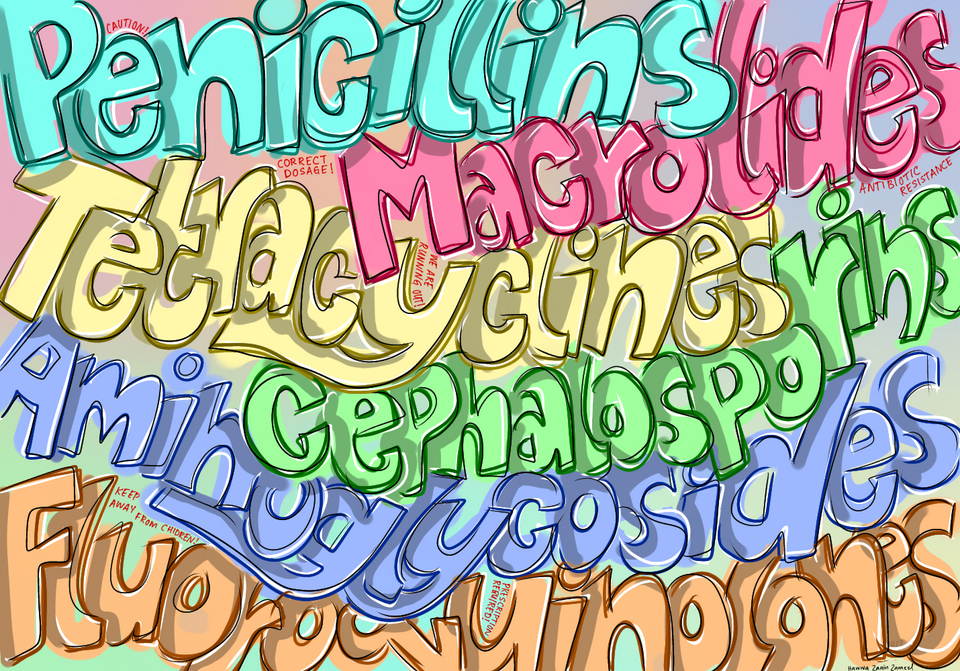Antibiotics: Discovery, Dominance and Possible Death

Once upon a time, a person could die from a paper cut. No, I'm not joking. Any wound was fatal if it got infected. Bacterial infections were deadly, and there was no cure. Until, in 1928, a scientist made an accidental discovery that changed the world: a mould. It might not sound like much, but this mould was the key to a much bigger breakthrough: antibiotics - the miracle drug, the cure for previously incurable infections. With the discovery of antibiotics, human life expectancy increased dramatically. Today, they save millions of lives all over the world. The superheroes of the world of medicine - antibiotics seem invincible. But a new villain has been gaining power, threatening to render these heroes useless: antibiotic resistance. It's up to us to stop it, or else the world shall once more be plunged into a storm of diseases and infections against which we are all powerless. It's up to us to protect our miracle.
I have a lot of random memories from when I was really young, and some of these are just words that I heard, but didn't know the meaning of. One that really stuck in my mind was antibiotics. The word was alien to five-year-old me, but as I grew up, I developed a vague understanding that it was some sort of medicine. Well, I wasn't wrong, but I hadn't even scratched the surface of this immensely important, fascinating topic.

Antibiotics are indeed a type of medicine, more specifically, for treating infections caused by bacteria. They do this by either killing the bacteria or by preventing the bacteria from multiplying. There was a time when bacterial infections caused the majority of human deaths worldwide, but that all changed with the discovery of the first mass-produced antibiotic: penicillin.
The discovery of this 'miracle drug' is like something out of a storybook. The year was 1928. A slightly disorderly scientist, a contaminated Petri dish, and a mysterious mould. The scientist in question was Scottish bacteriologist Alexander Fleming, the Petri dish contained staphylococcus bacteria colonies, and the mould contaminating it was penicillium notatum. Fleming found that a certain substance found in the mould killed the staphylococcus, and upon further investigation, he found that it also killed a variety of other harmful bacteria.
Fleming named this substance penicillin, but it wasn't isolated from the mould and purified for treating humans until 1939, by Australian pathologist Howard Florey and British biochemist Ernst Chain.
When penicillin was made widely available in America during World War II, it immediately made a huge impact in healthcare. Wounds and diseases that used to be untreatable and deadly could now easily be cured. Antibiotics saved, and continue to save, millions of lives.
Today, hundreds of new antibiotics have been discovered. Most of these can be sorted into six main groups: penicillins, cephalosporins, aminoglycosides, tetracyclines, macrolides and fluoroquinolones. Despite the existence of so many types of antibiotics that treat a myriad of different bacterial infections, they are rapidly becoming less and less effective. This is because bacteria have a habit of evolving to become immune to antibiotics. This is called antibiotic resistance, and it poses a huge threat. It means that antibiotics will no longer be able to kill those mutant strains of bacteria.
Antibiotic resistance occurs naturally, but humans have been inadvertently hastening the process. Administering antibiotics in situations where the infection can be treated without them, results in the bacteria becoming resistant to it, rendering the drug useless when it really is needed. Failing to finish our prescribed dose of antibiotics, because we feel better before the medicine has run out, also contributes to speeding up antibiotic resistance. If we stop taking the medicine before it kills all the bacteria, the survivors will mutate into something we cannot fight. If this goes on, eventually all bacteria will be resistant to antibiotics, and we will once again be completely helpless against infections.
Therefore, to slow down the process of antibiotic resistance in order to give scientists time to develop new antibiotics to replace the ones that bacteria are now immune to, doctors, governments, pharmaceutical companies and the general public all need to play their part. Antibiotics are a blessing to be treated with great caution. If we continue to be irresponsible with them, we may cause damage beyond repair.
References
American Chemical Society, (2019). Discover the importance of antibiotics and how to prevent their overuse. November 8, Available at: https://www.britannica.com/video/186995/antibiotics-overuse (Accessed: 3 March 2022)
National Health Service, (2019). Antibiotics [online]. NHS. Available at: https://www.nhs.uk/conditions/antibiotics/ (Accessed: 3 March 2022)
Microbiology Society, (2015). The history of antibiotics [online]. Microbiology Society. Available at: https://microbiologysociety.org/members-outreach-resources/outreach-resources/antibiotics-unearthed/antibiotics-and-antibiotic-resistance/the-history-of-antibiotics.html (Accessed: 3 March 2022)
American Chemical Society. Discovery and Development of Penicillin [online]. ACS. Available at: w.acs.org/content/acs/en/education/whatischemistry/landmarks/flemingpenicillin.html (Accessed: 3 March 2022)
Britannica, (2021). antibiotic [online]. Britannica. Available at: https://www.britannica.com/science/antibiotic (Accessed: 3 March 2022)
World Health Organisation, (2020). Antibiotic resistance [online]. WHO. Available at: https://www.who.int/news-room/fact-sheets/detail/antibiotic-resistance (Accessed: 3 March 2022)
Adedeji, W.A. (2016). 'THE TREASURE CALLED ANTIBIOTICS', Annals of Ibadan Postgraduate Medicine, 14(2) [online] Available at: https://www.ncbi.nlm.nih.gov/pmc/articles/PMC5354621/ (Accessed: 3 April 2022)
Author biography
Zaain is 14 years old and loves to read. Fantasy and adventure stories are her favourites, but she likes reading about different non-fiction topics too. She also enjoys drawing, crafting, and calligraphy and loves anything to do with the ocean and the beach. She likes travelling too because it's a doorway to a treasure trove of new knowledge and unique experiences. For the same reason, she is very grateful for the opportunity to participate in theCircle by Ugail Foundation's Leaders of Tomorrow programme.
Cite this article as:
Hawwa Zaain Zameel, Antibiotics, theCircle Composition, Volume 2, (2022). https://thecirclecomposition.org/antibiotics/
